Equine Medical Services
The equine medical services offered by Equine Specialty Hospital, provide complete veterinary care for your horse. In addition to basic care such as equine internal medicine, we are able to evaluate and treat neurological issues as well as opthalmic and respiratory conditions. Our facilities can accomodate intensive care for both neonatal and adults, and prenatal care for high risk mares and foals.
Internal Medicine
Equine internal medicine deals with the prevention, diagnosis and non-surgical treatment of a variety of diseases in adult and pediatric patients. Most commonly these diseases involve the respiratory, digestive or neurologic system but also include cardiac, endocrine, kidney and liver disease.
We have dedicated intensive care stalls, neonatal stalls, sling stall for neurologic for recumbent horses and an isolation barn to allow for the hospitalization of patients. The care of all our patients is supported 24/7 by a veterinary team, with additional staff added during foaling season when we have a higher volume of hospitalized and critical patients.
Neonatal Intensive Care Unit
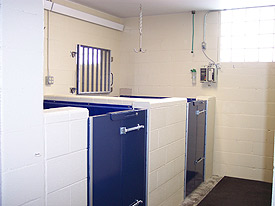
The Neonatal Intensive Care Unit at the Equine Specialty Hospital is fully equipped to accommodate foals requiring intensive medical or surgical care. The unit consists of two heated and fully padded neonate stalls. These stalls are equipped for in-stall oxygen delivery, full in-stall vital sign monitoring (ECG, indirect blood pressure, etc.), and continuous intravenous fluid and intravenous nutrition administration. The dam of the critically ill neonate can be housed in an immediately adjacent stall. She may be allowed either visual contact or direct contact with the foal as appropriate.
A separate 12’ x 12’ climate controlled (heat and air conditioned) stall is equipped with a foal bed. This stall allows the mare and foal to stay together in an intensive care setting. The level of intensive care provided to neonates is tailored to the patient’s needs. Continuous nursing care for critically ill neonates is standard and continues until improvement in the foal’s condition dictates otherwise.
Adult Intensive Care
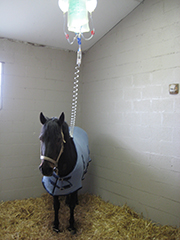
Intensive care of critically ill or post-operative patients is provided 24 hours by a team of veterinary specialists, registered veterinary technicians and veterinary assistants. The facilities, equipment and personnel at the Equine Specialty Hospital provides advanced intensive care and treatment for all patients.
Neurologic Evaluation and Treatment
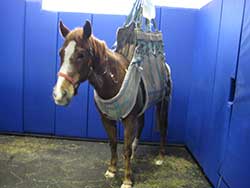
Neurologic conditions in horses can range from infectious diseases such as West Nile or Herpes Viruses, protozoal causes such as Equine Protozoal Myeloencephalopathy (EPM), compressive lesions of the spinal cord such as Wobbler’s Disease, or trauma to the spine. To determine which of these problems the horse has, our specialists first perform a thorough neurologic evaluation to localize the disease to a specific area within the brain or spinal cord.
A neurologic evaluation consists of assessing cranial nerve function, checking for muscle atrophy or loss, watching the horse walk in a straight line and in circles, and observing the horse walk up and down hills. After this portion of the examination, additional diagnostic tests such as digital radiographs of the cervical spine (neck) or a spinal tap to sample the cerebrospinal fluid may be performed. If deemed warranted, myelography to further assess compressive lesions in the cervical spine can be performed on anesthetized horses.
Horses with neurologic conditions are housed in our specially designed padded stall equipped with a hoist. If needed, dynamic sling support is available to help these patients remain standing. If the horse is recumbent and unable to stand, thick mattresses are installed to allow cushioning of the horse’s muscles while it is laying down.
Respiratory Evaluation and Treatment
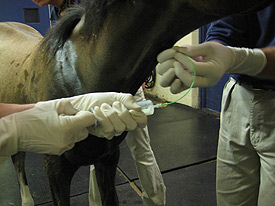
Respiratory disease in horses can involve the upper respiratory tract such as the nasal passages, sinuses, and throat, or the lower respiratory tract including the trachea and lungs.
Upper airway abnormalities are diagnosed using video endoscopy and digital radiography of the nasal passages. Abnormalities diagnosed in these locations may include (but are not limited to) laryngeal hemiplegia, dorsal displacement of the soft palate, sinus cysts and then problems within the guttural pouches.
Diseases of the lower airway are diagnosed using a combination of video endoscopy, digital radiography and ultrasonography of the chest, transtracheal washes, and bronchoalveolar lavages. Pneumonia, pleuropneumonia (shipping fever), exercise-induced pulmonary hemorrhage, inflammatory airway disease, and heaves are all diseases of the lower airway that require diagnosis using the above techniques.
Ophthalmic Evaluation and Treatment
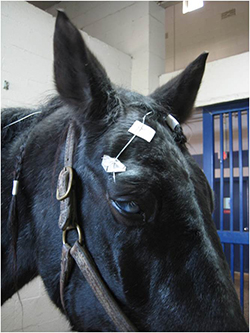
The Equine Specialty Hospital offers diagnosis, treatment, and surgery of many ocular problems, ulcers, uvitis, and tumors. Extended hospitalization for intensive care of critical cases is available. Services are provided by specialists in surgery with advanced training in ophthalmology.
Perinatal Care for High Risk Mares and Foals
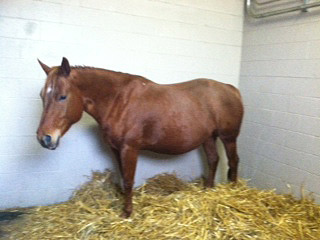
Obstetrical care for high risk pregnancies or for mares that experience complications at the time of foaling is available at the Equine Specialty Hospital. Services include digital ultrasound of the fetus and placenta, monitoring of hormone levels, controlled vaginal delivery, cesarean section and intensive care with round-the-clock monitoring.
For High Risk Mares & Foals: Perinatal routine foaling services are also available.


